I’m still playing catch-up, trying to get the most recent episodes of the Saturday Six Pack posted here. I’m sorry that it’s been taking me so long… The episode I’m posting here tonight was our 40th, and it was great… There was something for everyone; political intrigue, grassroots activism, science in the public interest, societal change through rap… Seriously, I don’t know if we’ve ever had such a well-rounded show. If you get a chance, check it out.
During episode 40… We talked with hip-hop artist Jamall Bufford about his work to inspire “social regeneration” through the medium of rap. We called Lee Anne Walters of Flint and asked her about her recent testimony in front of Congress. We learned about ongoing efforts to weaken clean drink water regulations from Virginia Tech’s Yanna Lambrinidou. And we spoke with Eastern Michigan University faculty members Judith Kullberg and Howard Bunsis about their recent vote of “no confidence” in their Board of Regents, and what might come next.
[If you would like to listen to episode 40 of The Saturday Six Pack, you can either download it from iTunes or scroll the bottom of the page, where you’ll find the Soundcloud file embedded.]
HIP HOP ARTIST JAMALL BUFFORD OFFERS A GLIMPSE OF BLACK NIRVANA
We started the show with Jamall Bufford, who first started making a name for himself in the rap world about a decade ago as Buff1, a member of Ann Arbor’s Athletic Mic League. We talked about the scene at Pioneer High School at the time, how the members of his crew first came together, and how their earliest beats had been made on tape decks and engineering software that wasn’t meant for such things. I tried to get him to talk about how easy kids had it today in comparison, but he wouldn’t take the bait. Bufford said he thought it was awesome that young people today, like those that he works with on a daily basis at the Neutral Zone, have ready access not just to software and studios, but a supportive community.
Most of our discussion centered around the work Bufford has been doing with collaborators over the past five years as The Black Opera, and their most recent endeavor, a theatrical performance called Black Nirvana, which they hope to roll out next fall. This new piece, which will incorporate rap, film, science fiction and any number of other elements, will center around a young man, Bufford tells us, who creates a world of his own within and abandoned house in Detroit. He’s a high school aged kid, Bufford says, who’s kind of an outcast. He likes art, music and reading. He’s a collector. He creates a sanctuary of sorts, but everything begins to implode for him when his younger brother, who had chosen to take a more dangerous path through life, is killed there. The house is firebombed, Bufford tells us, sending the protagonist on a soul-searching journey through time. [There’s a time portal involved.]
Bufford and I talked about how The Black Opera collective came together – how it arose from a desire on the part of several local rappers to get beyond the idea that rap, in order to be considered both good and authentic, has to be about real, personal experience. He and others, he tells me, wanted to create personas and write from the perspective of other people. So they created The Black Opera as a vehicle through which they could anonymously explore. [Up until about a year ago, he and his collaborators didn’t publicly identify themselves as members.] The experience, he told us, was liberating. The Black Opera, he says, allows him to get beyond his own, narrow point of view, and talk more broadly about subjects that are more global in nature.
“I love growth,” Bufford says when asked why he keeps pushing in new directions, incorporating film and drama, working with new collaborators, etc.
We talk about his coming here as a kid from Atlanta and his experience growing up black in Ann Arbor. We talk about how he got started, first learning the words of other rap songs to impress his friends, and then eventually coming to know his own voice as an artist from Ann Arbor. [He said he always loved music, but couldn’t play an instrument, and couldn’t really sing, so he gravitated to rap.] He realized at some point, he said, “I don’t have to claim Detroit… This is who I am.”
And we talked about what he wants to accomplish with his music. He says he wants to provoke with his art, and cause something to happen. He says that, through his solo work, and the work of The Black Opera, he wants to engage with people and inspire them to create positive societal change. [Although he says he’s somewhat apolitical, Bufford has described his work in the past as, “a weapon for socioeconomic unity.”]
Bufford, who just recently won a grant from the Ann Arbor Awesome Foundation to help construct the set for Black Nirvana, hopes to eventually take the production across the United States and to Europe, where The Black Opra has toured twice before. This time, he tells us, they’d like to stay longer in the towns that they visit and engage with the young people there, working with them on their writing and performing.
LEE ANNE WALTERS ON REPRESENTING THE PEOPLE OF FLINT BEFORE CONGRESS
At the 45 minute mark, I called Flint water activist Lee Anne Walters, who we’ve talked with on the show before, and asked her what it was like to testify before Congress… Her impression, she says, based on what she was told, was that real action would be taken this time. But, as she told us, people thought the same thing back in 2004, after the lead poisoning epidemic in Washington, DC. With that said, though, Walters told us that she has already seem some evidence of progress. For instance, she told us that when she shared with the EPA’s new Deputy Assistant Administrator for the Office of Water, Joel Beauvais, that, even now, the people in Flint were using the wrong kind of bottles to collect water samples, leading to unreliable lead readings, he made sure the problem was addressed within 48 hours. [Beauvais, Walters also said, gave her the most heartfelt apology of anyone in government since all of this first began for her and her family.]
We also talked about how things have changed in Flint since the story went national a few months ago now. According to Walters, who has a son that’s been diagnosed with lead poisoning an anemia as a result of drinking the water, as of yet no one from either the city or the state has reached out with information as to what she can do as a parent to help her son. No one has come forward with the offer of resources, let alone things like food and vitamins that may help in his treatment, she says.
Walters and I also discuss how little credibility our state and local leaders now have in Flint. It will take a very long time, she says, for the parties involved to regain the trust of the people in Flint. According to Walters, unless you’re from Virginia Tech, the people of Flint aren’t inclined to believe anything you say. [It’s Virginia Tech researchers that came to Flint and worked with the citizens to document the problem, raise awareness, and fight for action.]
This, in case you’re interested to know what I look like when I talk with people over the phone, is me talking with Walters…
YANNA LAMBRINIDOU ON THE CONTINUED THREAT OF LEAD IN OUR WATER
Then, at the 1:08 mark, I called activist and educator Yanna Lambrinidou, who is one of those awesome people from Virginia Tech that Walters alluded to above. Lambrinidou and I discussed the history of the EPA’s Lead and Copper Rule, and how, since it was first passed in 1991, it’s been systematically weakened by water utilities. We talked about both political forces and industry pressure, and how, over the past 25 years, they’ve been working together against our best interests. [Water utilities, says Lambrinidou, have been collectively pushing for lower standards since the law first passed, and they’ve been successful.]
And we talked about the importance of an engaged citizenry. As Lambrinidou reminded us, it wasn’t a so-called expert who discovered that Flint wasn’t treating their water. It was Lee Anne Walters. This demonstrates, she says, why it is that we can’t leave it to the professionals, who often have conflicts of interest. People have to be a part of entire process, Lambrinidou says. And that’s why she’s building a coalition, along with the help of Walters, that can push public awareness and demand action. The EPA will only act in a significant way, she says, “when the peaple say ‘enough is enough’.”
We also discussed the underfunding of our environmental agencies, like the Michigan Department of Environmental Quality and the EPA, and the fact that Republicans, who cut their funding for years, are now looking to place the blame for what happened in Flint at their feet.
What we saw in Flint, and DC before that, says Lambrinidou, is going to happen in other towns around the United States. In fact, she says, it already is. “What’s happening in Flint is happening elsewhere,” she says. There are 10 million lead service lines in this country that lead into people’s homes, and no enforceable standards, she says. And, she adds, even treated water leaches lead from pipes.
EASTERN MICHIGAN UNIVERSITY FACULTY DECLARE “NO CONFIDENCE” IN REGENTS
Then, as 1:26, after an instrumental number by our friend Pete Larson in Kenya, we were joined by Eastern Michigan University faculty leaders Judith Kullberg and Howard Bunsis for a rousing discussion on the increasingly tense relationship between those doing the work of educating students on campus and the Regents who oversee the business operations. I’d intended to talk mainly about the “no confidence” measure that the faculty had just passed, but, as luck would have it, the day before the show, EMU’s regents announced that they’d hired a new President. So, much of our time was spent discussing their new boss, Jim Smith.
Kullberg [pictured above] said she’d just met Smith briefly, but was “favorably impressed.” [She had been expecting, she said, that the Regents would hire a politician or business person to run the university, so I imagine that a good deal of her favorable impression can be attributed to the fact that Smith is at least an academic.] Bunsis was decidedly less enthusiastic. “I don’t get how an academic would take a job with a secret search,” he said, referring to the fact that the new President had taken the position having only met the Regents, and not anyone on the faculty. [EMU’s regents have defended their decision to have a secret search, saying that it would yield better candidates.] Bunsis said that, given the Smith was coming from a very small university in South Dakota, with very little diversity, no PhD program, and no unions, there were quite a few questions that he ands fellow faculty members would have liked to have asked during the hiring process.
And we did talk quite a bit about the “no confidence” vote, which came about after faculty in EMU’s education department delivered a detailed analysis of the State’s Educational Achievement Authority (EAA) program for the Regents, only to have their findings ignored… The EAA, as you’ll recall, is an initiative created by Governor Snyder, through which many of Detroit’s public schools had been taken over by the state. Eastern Michigan University, thanks in part to the fact that a majority of its Regents were appointed by Snyder, had agreed to be the educational institution that would make the whole thing possible. The Regents had assured faculty that the relationship would only exist so long as it was beneficial to the students of Detroit. When, however, EMU educators came forward with evidence that the program was failing, and student performance across EAA schools was actually dropping, the Regents failed to act and end the relationship. And that’s why the “no confidence” vote was taken. The EMU Regents, simply put, had proven beyond a shadow of a doubt that they existed only to further the political goals of Governor, and not to serve either the EMU community or the people of Michigan. “They helped destroy the reputation of Eastern Michigan,” said Bunsis.
We also talked quite a bit about EMU’s sending on sports. Looking at the budget, they said, it’s clear that, while athletics spending is going up, “the academic side is being starved.” For instance, while 20 faculty positions have been eliminated in recent years, they said, 8 new coaches have been hired. EMU, they told us, is now one of the top 20 schools of its size when it comes to athletic spending. [And it’s not translating to either wins or increased ticket sales.]
We talked about a lot of other things as well… like the passing of Antonin Scalia, and the impact his death would have on union-related cases currently in front of the Supreme Court, the possibility that EMU’s Regents might one day be elected instead of appointed, and the positive things that have happened as a result of these recent battles between faculty and regents at EMU. There’s a lot of unity on campus now, Xullberg says. People are making connections, and being pulled together. Everyone saw that the board was working on behalf of Lansing, and they knew what had to be done in order to save the institution, she said.
Thanks, as always, to AM 1700 for hosting the show, Kate de Fuccio for documenting everything with her camera, and Brian Robb for running the board, making sure the bills paid, and insuring that the toilet paper and bleach stays stocked. [All photos above come courtesy of Kate.]
If you like this episode, check out our archive of past shows at iTunes. And do please leave a review if you have the time, OK? It’s nice to know that people are listening, and, unless you call in, that’s pretty much the only way we know.
Now, if you haven’t already, please listen for yourself, and experience the magic firsthand.
[Episode 40 of the Saturday Six Pack was recorded live on Released 13 February, 2016, in historic downtown Ypsilanti, Michigan, in the studies of AM1700 Radio.]

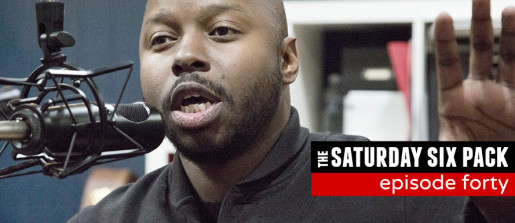
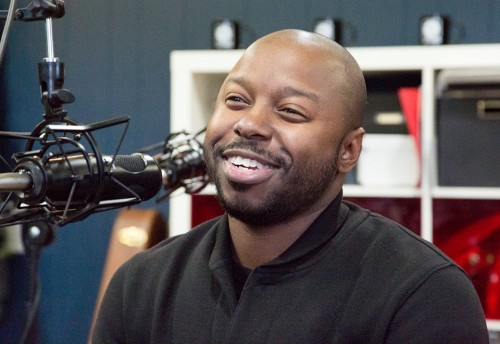
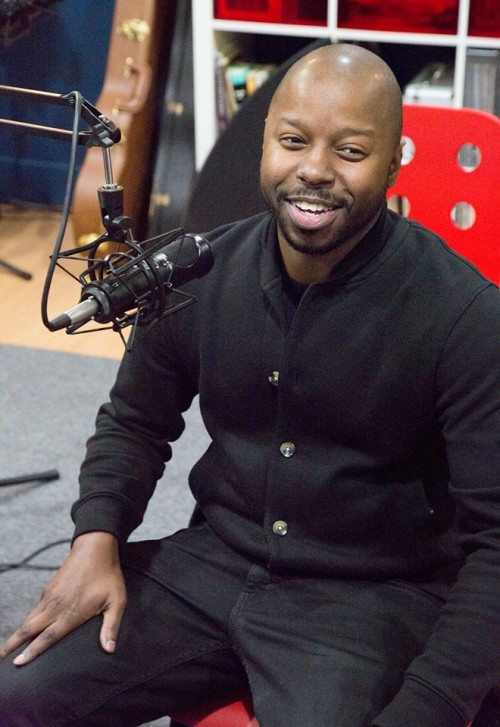
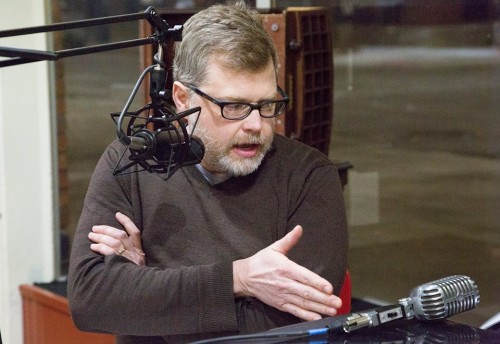
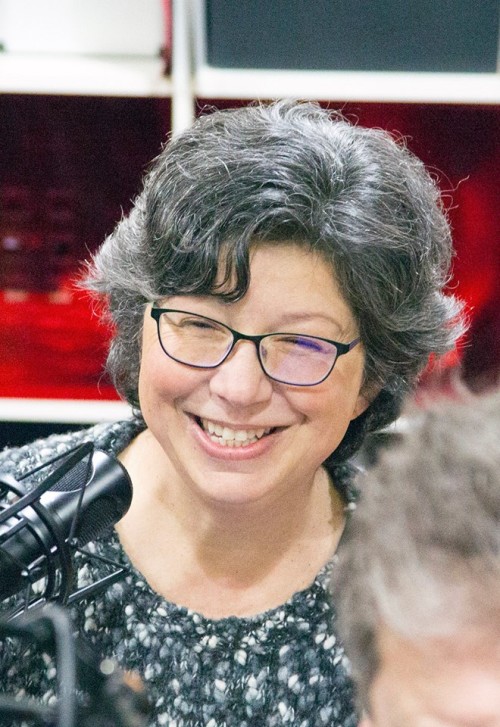
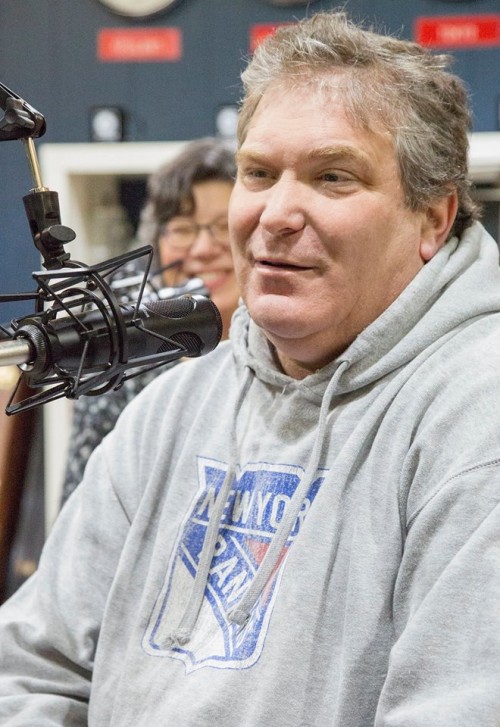











2 Comments
Bunsis mentions that HBO was on EMU’s campus filming something and the sports programs. Do you know what it was for? Are they doing a “30 For 30” on universities that gamble on athletics and lose?
Sci-fi rap opera? Sign me up.
One Trackback
[…] you want to know more, and don’t have HBO, just listen to my last interview with Bunsis on the Saturday Six Pack. While we were primarily discussing the faculty’s vote of “no confidence” against […]